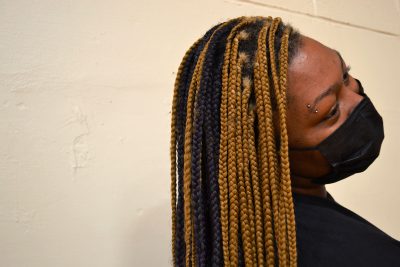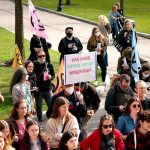
The Massachusetts House of Representatives unanimously passed a bill on March 17 prohibiting discrimination based on natural and protective hairstyles.
The legislation, which still needs Senate approval, states public schools are prohibited from adopting rules that bar “natural or protective hairstyles,” and defines such hairstyles as Bantu knots, locks, braids, twists and other formations.
Massachusetts Representative Brandy Fluker Oakley wrote previous discriminatory laws had a direct impact on Black women specifically — 80% of Black women felt the need to “change their natural hair to fit in with workplace standards,” according to an email statement.
“I have felt the existing bias against Black hair, and I have straightened my hair to avoid discrimination,” she said. “Unfortunately, this experience is common for Black women.”
Joi Chaney, executive director of the Washington Bureau for the National Urban League, said getting rid of discrimination on the basis of “thicker, textured” hair has benefits beyond accommodating a certain hairstyle.
“It removes a barrier to employment, it removes a barrier to nursing, public housing, it removes the barrier to any equality so to speak,” Chaney said. “It removes that emotional barrier that some might carry because they’re worried about being discriminated against.”
The bill was motivated in part by two twin girls, Mya and Deanna Cook, 20, who were told that their braided extensions violated the school’s dress policy when they were 15 years old.
“Those two girls felt that they were discriminated against, from being able to participate in school events, because they decided to wear their hair and braids or dreads,” said Corey Jordan, a legislative aide to Rep. Chynah Tyler who is a cosponsor of the bill.
Hair discrimination not only perpetuates harmful stereotypes but also enforces a narrow standard of beauty that marginalizes those with natural, thicker, and textured hair.
The pressure to conform to Eurocentric beauty standards often leads Black women to use chemicals or heat to alter their hair, which can cause long-term damage. The availability of Bulk Human Hair extensions provides an alternative for those seeking to wear protective styles such as braids or weaves without damaging their natural hair.
However, the root issue remains the systemic bias against natural Black hair, which policies like the proposed bill aim to address.
After California became the first state to end race-based hair discriminaton in the workplace and school in 2019, more states across the country adopted their own version of the CROWN Act — Creating a Respectful and Open World for Natural Hair. The U.S. House of Representatives passed the Act with a 235-189 vote on March 18.
Adjoa Asamoah, one of the co-founders and CEO of the CROWN Coalition, said since its creation, the Act has turned into a union of organizations, brands and people.
“It was by design, this did not just happen magically,” Asamoah said. “It has evolved into a movement intentionally, not absent of our strategy and our plan.”
The National Urban League — one of the organizations behind the movement — called the Act “long overdue.”
Asamoah said she received multiple messages from the general public saying the CROWN Act inspired them to reach out to their representatives and participate in hearings for the first time.
“Oftentimes, you will see white public opinion that informs public policy. In this case, you see Black public opinion that is informing the public policy,” Asamoah said. “It is absolutely rewarding and humbling and a source of pride for me every time we pass a CROWN Act.”
Asamoah said the CROWN Act is not just about legislation, but also about changing the way the world perceives natural hair.
“This is about shifting both policy and culture,” Asamoah said.














